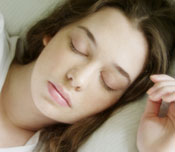 Drs. Kalyanakrishnan Ramakrishnan and Dewey Scheid from the University of Oklahoma Health Sciences Center have published a review of treatment options for sleeplessness.
Drs. Kalyanakrishnan Ramakrishnan and Dewey Scheid from the University of Oklahoma Health Sciences Center have published a review of treatment options for sleeplessness.
Melatonin, valerian, and several non-drug treatments are compared to benzodiazepines and non-benzodiazepine options.
The information below is modified from a table in the article. It focuses on sleep-onset latency and wakefulness after sleep onset.
“Sleep onset latency” (SOL) is the amount of time in minutes between laying down to sleep and the onset of sleep. “Wakefulness after sleep onset” (WASO) is the amount of time in minutes spent awake in bed following the attainment of sleep. The results are improvements as measured by fewer minutes (negative number) than the value at baseline.
CAM
- Melatonin: -8.3 / -9.7
- Valerian: -1.3 / -8.4
- Relaxation: -14.5 / -1.6
- Cognitive/behavioral: -4.6 / -18.2
- Exercise: -12 / –
Benzodiazepines
- Estazolam (ProSom): -10.2/ –
- Flurazepam (Dalmane): -23.1 / -12.4
- Temazepam (Restoril): -11.6 / -23.7
- Triazolam (Halcion): -19.7 / -40.0
Nonbenzodiazepines
- Eszopiclone (Lunesta): -16.7 / -25.8
- Zaleplon (Sonata): -20.1 / –
- Zolpidem (Ambien): -12.8 / -8.5
The bottom line?
Since these results are not based on head-to-head studies, one must be cautious in making comparisons. Also, safety and tolerability, important considerations when selecting treatment are not addressed here. That said, treatments that are best at getting people to sleep are not necessarily the best at keeping them asleep.
For example, melatonin might not get you to sleep quite as fast as Ambien, but once asleep, subsequent wakefulness is about the same. Also, if your problem is falling asleep, consider exercise.
According to the authors, melatonin improves insomnia caused by circadian schedule changes (eg, jet lag, shift work). The FDA has approved melatonin to treat circadian rhythm sleep disorder in blind children and adults. However, it’s unregulated and at higher doses causes sleep disruption, daytime fatigue, headache, dizziness, and irritability. Little information is available about the safety of long-term use.
With respect to valerian, there’s little evidence for effectiveness in treating insomnia. Residual daytime sedation and, rarely, hepatotoxicity are adverse effects are reported. Valerian-containing preparations are unregulated by the FDA.
Related topics are here, here, and here.
8/21/07 14:17 JR